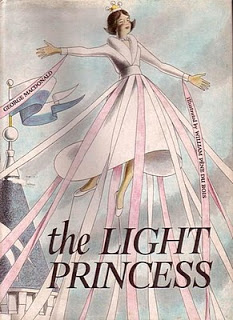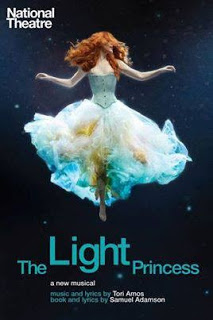The Light Princess facts for kids

Cover of 1962 edition.
|
|
| Author | George MacDonald |
|---|---|
| Illustrator | Arthur Hughes |
| Country | Scotland |
| Language | English |
| Genre | Fairy tale |
|
Publication date
|
1864 |
The Light Princess is a Scottish fairy tale by George MacDonald. It was published in 1864. Drawing on inspiration from "Sleeping Beauty", it tells the story of a princess afflicted by a constant weightlessness, unable to get her feet on the ground, both literally and metaphorically, until she finds a love that brings her down to earth. An animated version was released in 1978. In 2013, a musical version by Tori Amos and Samuel Adamson inspired by the original story was premiered for the Royal National Theatre in London. The stage production featured actress Rosalie Craig as the title character. The musical was generally well-received, enjoyed an extended run in the theatre, and had its cast recording released in 2015. Another musical also titled The Light Princess was written by Tony Lawton with music by Alex Bechtel, and debuted in April 2017 at the Arden Theatre Company.
Original plot summary
A king and queen, after some time, have a daughter. The king invites everyone to the christening, except his sister Princess Makemnoit, a spiteful and sour woman. She arrives without an invitation and curses the princess to have no gravity. Whenever the princess accidentally moves up in the air, she has to be brought down, and the wind is capable of carrying her off. As she grows, she never cries, and never can be brought to see the serious side of anything. The court philosophers, when consulted, are unable to propose any cure that the king and queen will suffer to be used.
She passionately loves swimming, and when she swims, she regains her gravity. This leads to the proposal that if she could be brought to cry, it might break the curse. But nothing can make her cry.
A prince from another country sets out to find a wife but finds fault in every princess he finds. He had not intended to seek out the light princess, but, upon becoming lost in a forest, he finds the princess swimming. Thinking she is drowning, he rescues her, ending up with her in the air, with her scolding him. He falls instantly in love and, upon her demand, puts her back in the water, and goes swimming with her. Days pass and the prince learns that her manner is changed between the water and the land, and he can not marry her as she is on land.
Princess Makemnoit, meanwhile, discovers that the Princess loves the lake so she sets out to dry it up. The water is drained from the lake, the springs are stopped up, and the rain ceases. Even babies no longer cry water.
As the lake dries up, it is discovered that the only way to stop it is to block the hole the water is flowing from, and the only thing that will block it is a living man, who would die in the deed. The prince volunteers, on the condition that the princess keeps him company while the lake fills. The lake fills up. When the prince has almost drowned, the princess frantically drags his body from the lake to take it to her old nurse, who is a wise woman. They tend him through the night, and he wakes at dawn. The princess falls to the floor and cries.
The prince desired to travel overland with the Princess so she could find her feet. After the princess masters the art of walking, she marries the prince. Princess Makemnoit's house is undermined by the waters and falls in, drowning her. The Light Princess and her Prince had many children together.
Musical stage production
| The Light Princess | |
|---|---|

The National Theatre's poster for The Light Princess musical featuring Rosalie Craig as the weightless princess "Althea"
|
|
| Music | Tori Amos |
| Lyrics | Tori Amos Samuel Adamson |
| Book | Samuel Adamson |
| Basis | "The Light Princess" fairy tale by George MacDonald |
| Productions | 2013 West End |
In 2013, the National Theatre produced a musical staging of the story. It is adapted by Samuel Adamson; directed by Marianne Elliott, winner of the Tony Award for Best Directing in 2011, and has music and lyrics by Tori Amos. It was expected to premiere in London in April 2012, but The National Theatre announced in October 2011 that the production would be delayed until later in the year.
The musical opened to positive reviews in September 2013, starring Rosalie Craig in the title role, subsequently singled out as a stand-out performance. Craig was nominated for many awards, and ultimately won the Evening Standard's award for best actress in a musical. The choreography, lighting, set design, music (Amos) and other cast performances were also lauded and nominated for a range of awards. In 2014, Amos stated that the production team had ambitions of bringing The Light Princess to American Broadway, but expressed worry that the original National Theatre production might not be commercial enough for the American audience.
On creating the musical, Amos stated:

"It wasn’t commercial theater, so from the top down they (the National Theatre) said to us, do not dumb this down. You be brave, you be bold, you be confrontational. Sam and I said, well, this is a feminist fairy tale, and not everyone will be comfortable with it. It’s not always going to make everyone feel warm and fuzzy. It brings up confrontations between teenagers and their parents, that would resonate in the 21st century [...] The Light Princess has to be something that kids can come see, because it is a story of a teenage girl. It might be a little dark for some. But we found that there were kids that were completely entranced. And even though sometimes it got scary, they stayed with the story."
Selected tracks from the musical are available for streaming from the National Theatre, including "My Fairy Story", "Althea", "Ambhibiava" and "Better Than Good".
Story
For the stage production, the original MacDonald story underwent major changes:
The princess (now named Althea) loses her gravity and the ability to cry at age six, after her mother dies. Her father became a cold-hearted man after the loss of his wife. Their country Lagobel (which is rich in gold, but has no water) is at war with the neighboring Sealand (which has water, but no gold). When Althea's older brother is killed her father tells her she must prepare to be queen, but she laughs and refuses, leading to a disheartened Lagobel army being slaughtered in battle with Sealand troops. Althea's father tries various cruel cures to find her gravity, and tries to force her into an arranged marriage so she can provide a child to be a more suitable future monarch, but she escapes and flees to the wilderness that separates Lagobel and Sealand. There she meets Sealand's prince, Digby, who has been unable to smile since the death of his mother. The two fall in love and conceive a child, but soon fight as Digby wants a more traditional life in a house, while Althea wants to live in the lake forever. Digby returns home, where his cruel father dams the lake in order to cut off Lagobel's water supply and kill all the people. Digby runs away from his own arranged marriage and breaks down the dam, but is nearly killed in the process, causing Althea to cry and therefore regain her gravity. The two get married and live happily ever after, Althea becoming a marine biologist and leaving the running of the country to her female prime minister.
Adamson and Amos' story version was released in a paperback edition including the full script and lyrics.
Cast recording
A cast album of the 2013 London production was released in October 2015 by Universal/Mercury Classics. The album was to be produced by songwriter and composer Tori Amos, recorded during 2014 at different stops during her Unrepentant Geraldines Tour in support of her own album. Amos' tour team, including Mark Hawley and Marcel van Limbeek, engineered the cast album throughout the tour, having recorded the orchestra in April, and met up with the different cast members "as they were available". It was to contain all 33 tracks from the show and also feature exclusive bonus tracks sung by Amos. She expressed she was happy to be able to give The Light Princess a cast recording under these terms, because so many theatre musicals no longer get an album release due to the expense and logistics involved.
{{{name}}} at Project Gutenberg
- The Light Princess published by Rabbit Room Press

